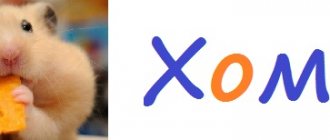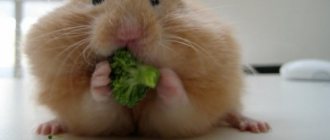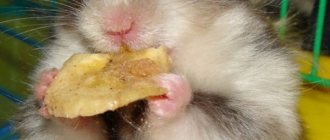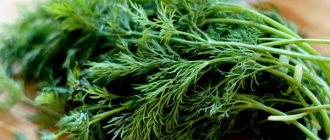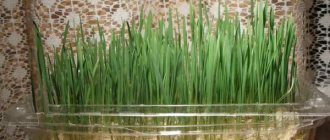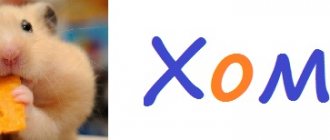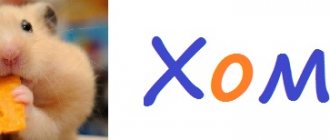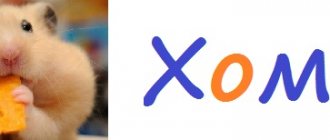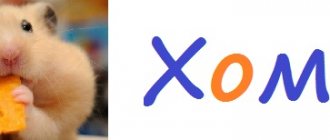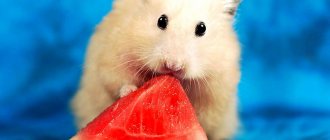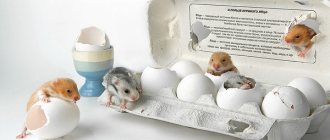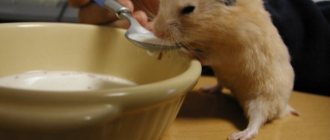The basis of a hamster's diet is cereals.
However, in addition to grains, the composition of the finished feed often includes seeds. Usually the pet eats them first and with great desire. Sunflower seeds are most often added to industrial feeds, but not because others are not allowed. They're just the cheapest. At home, you can diversify the rodent menu yourself. The owner just has to figure out which seeds can be given and which are deadly, whether a hamster can have fried seeds, in what quantity and how often such a delicacy can be given. Allowed:
- sunflower;
- pumpkin;
- linen;
- melon seeds;
- zucchini seeds;
- watermelon seeds;
- sesame.
Prohibited: apple, apricot, cherry pits.
Sunflower seeds: raw or roasted
In the wild, hamsters only eat raw seeds. Consequently, this food is familiar and healthy for them, because it saturates the animal’s body with nutrients.
Hamsters also love raw sprouted seeds. For this purpose, it is better to use flax and sunflower grains.
Roasted seeds have a richer taste, but during the heat treatment they lose some of their vitamins. In addition, roasted seeds contain a larger amount of vegetable fats, so their unlimited consumption leads to obesity in the hamster. You can give fried seeds to the animal, but only a little at a time.
Seeds fried in oil and with added salt should be excluded from the diet, since such food has a negative impact on the health of the hamster.
Can pumpkin be harmful?
Contains a large amount of fiber. It is not recommended for daily use by hamsters.
If you feed your hamster pumpkin more and more frequently, changes in the color of the rodent's coat may occur. So, for example, the fur of a white hamster will turn yellow, a cream hamster will turn orange, and a black hamster will turn brown.
Seeds as medicine
Some types of seeds will become not only a tasty treat for a rodent, but also a full-fledged medicine.
Pumpkin seeds contain many useful microelements (potassium, calcium, magnesium, phosphorus, zinc, copper, selenium, iron). This composition allows you to lower cholesterol in the blood and normalize the functioning of the heart and blood vessels. In addition, pumpkin seeds are rich in cucurbitin; this substance has an effective anthelmintic effect. Pumpkin seeds will be an excellent alternative to pharmaceutical anthelmintic drugs, which have a number of side effects and can be toxic to rodents.
Zucchini seeds have a similar effect; their inclusion in the diet will help protect the hamster from all types of parasites.
Flaxseeds improve intestinal function, help avoid constipation, and make the coat thick and shiny. This is due to its high fiber content, as well as Omega-3 and Omega-6 fatty acids. Sesame seeds have similar properties; moreover, they contain lecithin, which increases the body’s protective functions.
Sesame has a high fat content, so it can be consumed only in small doses, only for medicinal purposes.
Is it possible to give melon?
Melon is a very useful product for humans, but the body of rodents is a little different. High sugar content is harmful to small animals, especially toy breeds, which are prone to developing diabetes.
Among other things, this crop sold on store shelves is always grown using chemical fertilizers, which are absorbed into the peel and penetrate directly into the pulp. For a person, such a concentration is completely harmless, but for a hamster, large doses of melon can be fatal or cause very severe digestive upset, vomiting, constipation or diarrhea.
If you really want to please your pet, you can give your Djungarian hamster dried melon. The piece must be very small or mixed with other delicacies. It is advisable to include raw melon seeds in the menu.
What seeds and sunflower seeds can
Sunflower seeds are an essential component of specialized crushed feeds, since they contain fat-soluble vitamins A, E, D, amino acids and minerals.
The hamster is allowed to give the following seeds:
- sunflower;
- pumpkin and squash;
- flax and sesame;
- melon and watermelon.
These seeds slow down the aging of the body and have a positive effect on the cardiovascular and nervous system.
However, sunflower seeds are high in calories. Their abundance often leads to metabolic disorders; they should be given little by little.
They will be especially useful for pregnant females, because they contain vitamin B9, which promotes normal fetal development. The seeds are also rich in vegetable proteins and fats, necessary for the full construction of muscle mass, and pectin, which ensures the removal of harmful substances from the body.
Before use, melon and watermelon seeds must be thoroughly washed and dried.
Watermelons contain polyunsaturated fatty acids that maintain healthy skin and coat, vitamin D, which strengthens the skeleton, and other beneficial elements. These seeds also require preliminary washing and drying.
Djungarian hamster
This breed of dwarf pets. Their length is no more than ten centimeters. Weight up to 50 grams. The coat is very short and thick. The spine area is gray-brown, with a black stripe in the middle from head to tail. The eyes are just as bulging. The limbs are white along with the belly. Caring for it is much easier, but there is one rule. Each Djungarian hamster has its own home. You cannot put two individuals in one cage
Movement is vital for them, equip the cage with a running wheel
Feeding is carried out with a special mixture of food. Special mineral stones are purchased for teeth.
What seeds and sunflower seeds are prohibited
Hamsters are strictly prohibited from eating bones:
- cherries and cherries;
- apples, pears;
- plums, apricots;
- peach, nectarine.
All of these types of nuclei contain the glycoside amygdalin, which, when it enters the gastrointestinal tract, is converted into hydrocyanic acid. This substance is dangerous for hamsters even in the smallest doses, since the animals have a small body weight and a fast metabolism.
Rancid and moldy grains can also cause serious harm to a rodent; such food usually causes poisoning.
Nutrition
When the cage is equipped, the next thing that needs to be coordinated is the dzhungarik’s nutrition.
The basis of the diet is a grain mixture. The finished food contains the necessary nutrients, vitamins and microelements, thanks to which the Djungarian hamster's nutrition will be balanced and healthy.
Popular feed manufacturers:
- JR Farm;
- Little One;
- Fiory;
- Padovan;
- Lolo Pets;
- Vitapol.
In addition, Djungarian hamsters eat vegetables, fruits, green shoots and even protein foods of animal origin.
Therefore, a small pet’s diet should consist of the following components:
- Grain mixtures The main food is a mixture of various grain crops: millet, wheat, oats, buckwheat. Grain should be given in significant quantities, about a spoon at a time. It is necessary to observe how much the animal eats, since the grain should be left uneaten so that the hamster can snack when he is hungry before you give him the next portion of food.
- Vegetables It is necessary to feed the dzhungarik with vegetables so that he eats everything and the wet food does not decompose in the cage. If fresh vegetables remain uneaten, they must be removed from the cage. You can safely give: carrots, bell peppers, tomatoes, cucumber, pumpkin, zucchini, beets, radishes, lettuce.
- Legumes Green peas and other legumes can be given after first dousing them with boiling water, or boil them a little and give them pureed. Asparagus sprouts are very beneficial for a hamster.
- Greens Djungarians can eat greens: dill, parsley, celery, dandelion, clover, and plantain, which is very beneficial for the body.
Some fruits can be given as a treat, but not all and in limited quantities. Cherries, plums, sweet cherries, and apricots are real delicacies for your furry pet; hamsters often love them the most.
To protect your animal from undesirable consequences, the following foods should be excluded from the diet:
- Cabbage. It leads to bloating in the hamster, is very difficult for digestion, and the animal can die after tasting such food.
- Tomatoes. They can be given to Djungarian hamsters in small quantities; it is better to give them lettuce peppers, as they are more easily absorbed by the body.
- Potato. Starch is poison for the dwarf, so don’t take the risk.
- Beet. It is harmless, but does not bring any tangible benefit.
- Raw legumes. This is also not a suitable food for hamsters; it is better to boil them.
- Cucumber. Cucumbers can be given if you are sure that they were grown in environmentally friendly conditions; it is better to peel them before “serving”.
- Apple. Due to the risk of abdominal dropsy (ascites), animals should not eat apples.
- Pear. This fruit is weak and can cause stomach upset in your hamster.
- Peach. Too sweet, so you shouldn't treat your pet to it.
- Sea buckthorn and barberry. Too sour, it is better not to feed these foods.
- Watermelon and melon. They absorb harmful substances very well, therefore, they should absolutely not be eaten by dzhungarikas.
- Tropical fruits. All exotic and tropical fruits (oranges, tangerines, kiwis) are prohibited, with the exception of bananas. After drying them, you can make food for your hamster in the form of chips, which they love.
- Greenery. Do not feed your pet sorrel, green sprouts of onions and garlic. In small quantities, you can give celery (too juicy) and parsley (has a laxative effect).
- Bread. It is strictly forbidden to feed your pet fresh bread and other bakery products. But sometimes you can offer your pet a small piece of dry white bread.
- Dairy products. Cheese is also contraindicated for hamsters; it is better to give low-fat cottage cheese.
What to feed your Syrian hamster?
The Syrian diet in nature consists of:
- Seeds and cereals (the basis of rodent nutrition)
- Herbs
- Insects
In your home life, also try to adapt to this list.
A mixture of grains and seeds is the main thing you need to give your pet. An excellent option is ready-made dry food for hamsters. If the manufacturer has enriched the composition with vitamins and minerals, even better.
If you prefer to control the composition of the food yourself, and caring for the animal gives you pleasure, here is a simple video instruction for preparing the mixture.
The most common set is oats, millet, corn, and some seeds.
You can also add some nuts to the food (except for almonds and Brazilian almonds - they contain a high concentration of substances dangerous to rodents).
The Syrian hamster will also benefit from greens (lettuce, dill). Eliminate onion and garlic shoots and sorrel from your diet.
In season, add fresh vegetables, fruits and berries to your menu
But this should be done carefully. The Syrian is not as prone to diabetes as the Djungarian, but still avoid overly sweet fruits and starchy vegetables
Use the glycemic index table of foods - very useful information for those who care for the Syrian animal. Try not to give foods that have a GI of more than 50 - an excess of easily digestible carbohydrates.
Don't forget about protein. Buy ready-made dried insects or feed your pet 1-2 times a week with the following products of your choice:
- Egg white
- Boiled chicken breast
- Boiled lean white fish
Lactating and pregnant females, as well as their offspring, need special care and more protein - give protein foods a little daily.
We talk in detail about what you can and cannot feed your golden hamster in a separate article on the website.
When in season, berries are an excellent addition to your diet.
Seed selection
Pumpkin seeds. This is a good remedy against helminths, rich in vitamins and microelements that lower cholesterol and improve the functioning of blood vessels with the heart muscle.
Sunflower seeds are a component of natural food that is beneficial for the cardiovascular and nervous systems. The product is high in calories and rich in fatty acids, so it should be given less often to avoid obesity. A fat hamster may develop diabetes and suffer liver damage. Contains many amino acids, vitamins, minerals that help maintain vigor and tone.
Store-bought treats
On the shelves of pet stores you can find many different tasty products for small rodents:
- assorted vegetables and fruits;
- cereal sticks;
- canned treats.
The following are especially popular for hamsters:
- Little One (can) . The range includes: dried carrots, herb pads, puffed grains, mixed fruits and vegetables, peas.
- Little One (sticks) . Sticks in assortment: with the taste of nuts, herbs and flowers, puffed rice, berries.
- Little One assorted meadow herbs.
- Vitapol Smakers Box – cereal sticks with vegetables and fruits.
When choosing treats for your hamster, you should pay attention to the composition. The more natural ingredients, the better.
Can Djungarians have sesame seeds?
WHAT IS POSSIBLE
OR SHOULD OUR HAMMERS NOT EAT?
2. Seeds: sunflower (not roasted), pumpkin, melon, sesame
.
Interesting materials:
How much does the Easy 350 original cost? How much does Easy Boost cost? How much does zucchini cost per 1 kg? How much does cocoa cost in Pyaterochka? How much does Cal of Duty Modern Warfare 2022 cost? How much does KAMAZ land cost in Novosibirsk? How much does an at-home IV cost in 2022? How much does an at-home drip for binge drinking cost? How much does a capsule hotel cost in Pulkovo? How much does a capsule hotel cost in Vnukovo?
